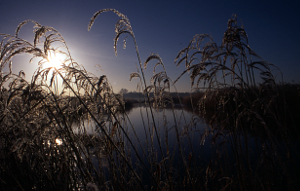Keep a log of the brown stuff, says WWT!
 There could be more pollution and waterborne disease in England’s rivers – and more cost to the taxpayer - because a Government cost-cutting exercise could backfire, says the Wildfowl & Wetlands Trust.
There could be more pollution and waterborne disease in England’s rivers – and more cost to the taxpayer - because a Government cost-cutting exercise could backfire, says the Wildfowl & Wetlands Trust.
The Government is proposing to ditch many requirements to keep track of septic tanks in England. It’s not known how many people have a septic tank, or how many are leaking – hence the need for a list. The sewage can filtrate into groundwater and into wetlands, rivers and our drinking supply. Investigations have formally traced more than 1,400 pollution incidents back to private septic tanks in England since 2002
WWT is urging the Government to simplify the septic tank owners’ list, rather than ditch it completely. WWT says ditching the list will miss opportunities to prevent pollution incidents, and could even increase the risk of incidents as we wouldn’t know where septic tanks are, or how old they are. The long-term burden on homes, businesses and taxpayers caused by pollution incidents could far outweigh the short-term saving on administration costs.
WWT Head of Conservation Policy Jeff Knott said:
“It’s a no brainer to have a list of who’s got a septic tank. Otherwise where there’s a pollution incident, we won’t know where to start looking for the source.
“Having a list can actually help to prevent pollution and disease, a much safer and cheaper approach than treating the problems after they’ve got worse. We’d know where there are several septic tanks close together which increases risks, or where there are old tanks that are more likely to cause problems.
“By making the list as simple as possible, the administration burden could be reduced for homes and businesses, without taxpayers having to pay extra for wild goose chases to work out where pollution is coming from.
“Most pollution incidents are inadvertent. Keeping a list will help septic tanks owners to avoid getting into problems. Prevention is almost always cheaper than a cure. Keeping these records can really help prevent problems and better target responses, making sure the public get maximum value for money and our valuable rivers and wetlands are properly protected”

